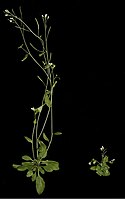
Photo from wikipedia
Endosomal trafficking plays an integral role in various eukaryotic cellular activities and is vital for higher-order functions in multicellular organisms. RAB GTPases are important proteins that influence various aspects of… Click to show full abstract
Endosomal trafficking plays an integral role in various eukaryotic cellular activities and is vital for higher-order functions in multicellular organisms. RAB GTPases are important proteins that influence various aspects of membrane traffic, which consequently influence many cellular functions and responses. Compared to yeast and mammals, plants have evolved a unique set of plant-specific RABs that play a significant role in their development. RABs form the largest family of small guanosine triphosphate (GTP)-binding proteins, and are divided into eight sub-families named RAB1, RAB2, RAB5, RAB6, RAB7, RAB8, RAB11 and RAB18. Recent studies on different species suggest that RAB proteins play crucial roles in intracellular trafficking and cytokinesis, in autophagy, plant microbe interactions and in biotic and abiotic stress responses. This review recaptures and summarizes the roles of RABs in plant cell functions and in enhancing plant survival under stress conditions.
Journal Title: Current Genomics
Year Published: 2021
Link to full text (if available)
Share on Social Media: Sign Up to like & get
recommendations!